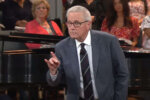Do you remember The Lone Ranger, the TV Western that was a hit program in the 1950s? Tonto and the Lone Ranger would end the show by riding side-by-side on their horses into the sunset. The ideal image reinforced the theme of the two culturally different heroes acting as “one man” in their mission to preserve justice.
Could it be that this is the best picture we’ve seen of partnership between Native and non-Native peoples? No, though some Christians in the North American church still act as if it is.
The perfect model is the one the apostle Paul writes about in Ephesians 2:14-16. He states that through the completed work of Christ on the cross God has torn down the walls of hostility and animosity that have separated peoples.
The church in North America faces a challenge–a lingering one–to discover the true “one man” described in Ephesians 2. After 500 years of missions, we still have yet to see walls of hostility and distrust come down and issues of injustice and inequality experienced by First Nations and immigrant peoples truly reconciled at the cross of Christ.
Before we can successfully confront this challenge, we must recognize at least three barriers to our becoming “one new man” in the body of Christ.
Paternalism. I see this all the time when talking with Anglo ministry leaders. It is the systemic attitude in Christian leadership structures that regards Native people as lacking sufficient “ministerial competence” to be entrusted with authority and leadership. It is the tendency not to fully trust, empower or release Native leaders to minister in culturally appropriate ways.
Apathy. “Out of sight, out of mind” typifies the church’s awareness of Native peoples. There is a deep ignorance about the realities Native people face and thus noninvolvement by churches in Native ministry. We are asked to “represent” Native concerns at reconciliation events, to pray for land dedications or to speak at conferences, but we are soon forgotten after that.
Arrogance. The church at large dismisses the prophetic significance First Nations people have in fulfilling God’s purposes for revival as spelled out in 2 Chronicles 7:14. Yet resolving issues about the land (literally and figuratively) and corporate sin as they relate to Native peoples is critical to seeing national renewal occur. As the host people, First Nations people have a unique relationship to the land that must be included in the cry for national repentance and revival.
Next, we must embrace the three keys to releasing this “one new man.”
Repentance. This will require acknowledging the three previous challenges for the sins that they are, then turning away from them. In the New Testament, the Greek word for repent is metanoeo and means “to think differently” or “to reconsider.” After 500 years, it is time to think differently about and reconsider First Nations people!
Reconciliation and restoration. We are reconciled to God’s purpose and intention for the “one new man,” not reconciled to a former healthy relationship–because there never was a healthy relationship. Reconciliation among Christians is the beginning of a journey whose destination is one body that reveals a level of mutual love and relationship that overcomes the barriers of skin color, language, economics, class and denominationalism, and thus convinces the world that God is among us.
Brotherhood and partnership. This begins by acknowledging and embracing First Nations believers and leaders as valued, co-equal partners in the life, work and mission of the church worldwide. It means no longer treating First Nations people solely as a mission field. We are your co-equal partners in ministry.
I challenge you as a fellow believer to identify First Nations ministries and leaders that you can build relationships with, support financially and pray for regularly. As we choose to walk in the light together, we’ll eventually ride into the sunset together. It is from relationships that we will discover and live out the realities of the Father’s “one new man.”





Leave a Comment
You must be logged in to post a comment.